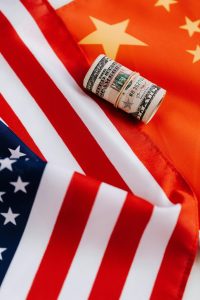'Stresses in this economy': NPR host talks inflation, recession fears at Springfield Public Forum
Before Marketplace radio show host Kyle Ryssdal began to delve into the multifaceted world of economics with an avid New England crowd at the Springfield Public Forum on Thursday evening, he posed a question to the audience:
Who in here checks their 401(K) every day, Ryssdal asked.
A few hands in the crowd of over a hundred were hoisted in response to the radio show hosts question.
Dont do that, Ryssdal said in response. How can you even sleep at night when youre doing that in a down market?
The Springfield Public Forum hosted Ryssdal as part of its public speakers series on Thursday night. A flock of younger and older people feverishly came to hear Ryssdal, host of the NPR broadcasted Marketplace radio show of nearly two decades, speak about the state of the economy which many consider difficult to grasp at a time of interest hikes and price gouging.
The Springfield Public Forum is one of the longest-standing public lecture series in the country. Hosting some of the most prominent thinkers and leaders in the 21st century including Pulitzer winner Jodi Kantor and Nikole Hannah-Jones, the journalist behind The 1619 Project.Related Content: Springfield Public Forum fall speaker series includes Pulitzer winner Jodi Kantor, Emmy nominee Chris Sullivan from NBCs This Is Us and Nikole Hannah-Jones, the journalist who inspired The 1619 Project
Ryssdal originally joined the economic-centric Los Angeles-based Marketplace radio program in 2005 shortly after serving in the U.S. Navy for eight years. He became engrossed in the ever-changing landscape of business and economics, commentating and witnessing firsthand as the U.S. and its citizens adapt to the market.
Woburn native and Western New England University employee, Mary Ellen Aronson, has been attending Springfield Public Forum events for over 20 years. She said shes also been listening to Rysdals commentary on the economy since hes been on public radio airwaves and was excited to finally see him speak in person.
Sylvia Callan, the moderator for the Springfield Public Forum event, said she wanted to kick things off Thursday night by discussing the 500-pound gorilla in the room.
Why is inflation so high, Callan asked.
With federal and state-level financial assistance being given out to U.S. citizens during the pandemic, Ryssdal said many people were purchasing the same goods at the same exact time. The Marketplace Host said the influx of consumers in a time when the global economy was largely stagnant caused what he considered to be a minor burp of inflation.
Weve had low inflation in this country for decades, Ryssdal said and that inflation suddenly shot up over the past 2 years since the pandemic. Home prices, shipping and car prices, everything went [up].
And now were actually experiencing a downslope, what we have now is not structural inflation, the Marketplace host said. The [Inflation] we have now will probably prove to be a relatively short period of time in the grand scheme of things.
Ryssdal clarified saying that he doesnt expect prices to rise up and come straight down, instead he believes current inflation will be more transitory.
Prices are going to go up and theyre going to stay elevated for a long while, the real sticky inflations like rent are going to stay elevated for longer, he said.
His talk of inflations downward slope led the interviewer to ask about his thoughts on the downward slope of the stock market the Dow Jones Industrial Average and S & P 500 took multiple dips during the summer.
Theres this thing called the wealth effect, Ryssdal said. When the rising stock market home values are increasing, the economy is generally growing, people feel wealthier. Even people who are not in the market, even people who dont own stocks, feel better when the stock market is up in the future. They are more likely to spend or engage in economic activity.
Ryssdal added that there are such things as a reverse wealth effect when the stock market is down.
Home prices have gone down and revenue prices have started to slow, so people start retrenching, the radio program host said.
The act of retrenching reduces and slows down all economic activity, Ryssdal said consumers can become very cranky during a retrenchment period.
It also decreases actual wealth, so youre now seeing that your 401(K) and your kids college fund are worth less now, he said.
Ryssdal urged people to stop checking their 401(K), investments and savings daily or weekly during economic turbulence. To avoid unnecessary stress, Ryssdal recommends people check their savings quarterly.
The radio show host gave the audience a disclaimer after his investment advice: Look Im not even in control of the money in my own house, my wife is.
During a previous interview with MassLive, Ryssdal said the investment responsibility is ultimately on each individual.
The stock market is a bet on the future of the corporate economy, the stock market is betting that corporate returns are going to be higher in the future, said Ryssdal. Whether that translated into whether you personally should invest, I think you have to decide that. I think each and every person has to decide that.
Callan went on to ask Ryssdal what he thought the major economic challenges everyday Americans are currently facing.
Regular people are worried about uncertainty, Ryssdal said. Theyre deeply worried about the prospect of rising unemployment, which is going to happen. And theyre concerned about corporate America doing better in tough times for regular people.
Ryssdal said the entrepreneurs and CEOs he speaks to on a weekly basis are worried about a host of separate issues.
Theyre worried about supply chains, theyre worried about inflationary costs, theyre also worried about how much of those costs theyre experience would be passed on to consumers without losing those consumers, Ryssdal said. And theyre worried about labor. Theyre worried about finding people.
When asked about the impact Russias war in Ukraine has had on the U.S. economy, Ryssdal said the war significantly inflated global economic issues that were prevalent before the European war.
There were stresses in this economy before Russia went into Ukraine: Supply chain problems, and inventory problems and all of those things, he said. But the Russian invasion of Ukraine exacerbated a lot of the challenges a lot of the fault lines in this economy.
People tend to focus on the wars impact on global gas distribution, with Russia being a major distributor in the global energy market.Read More: Ukraine-Russia conflict inflate gas prices across Massachusetts; average state gasoline price nearly a dollar above what it was last year
Many people experienced pain at the pump this summer paying upward of $100 a visit for gas. The California radio show host added that he was paying around $6.50 a gallon for gas in the golden state.
The rise in home heating gas prices is also expected to inflate most New Englanders heating bills this winter.
Major spikes in oil prices considered, Ryssdal believes people are overlooking the wars impact on edible oil prices with Russia and Ukraine being global leaders in sunflower oil production.
Wheat and grain prices have also been affected. This is just one example. Theres a huge part of the food supply chain affected by Russias war, Ryssdal said.
The public forum discussion expanded its scope globally to the current tensions between China and Taiwan and whether or not an eventual conflict or war would have an impact on the U.S. economy.
Ryssdal said the U.S. has historically had strategic ambiguity aligned with Taiwan, not explicitly showing support for Taiwan. However, in recent months with President Joe Biden stating that America would side with Taiwan in the event of a war with China, the Marketplace host believes America is lined up for a major conflict with one of the worlds leading powers.
Economically, its also a huge crisis, because China is the second biggest economy in the world, Ryssdal said, adding that e expects China to take the spot for the largest economy in the world reasonably soon.
Youve got an iPhone in your pocket right, Ryssdal asked the crowd. You know what it says on the box right? Created in Cupertino, assembles in China.
With the way the global economy has been structured, China has risen to be the worlds factory in Ryssdals opinion, making China critical in the global economy.
Callan shifted the conversation back domestically to ask Ryssdal about how the Federal Reserve plans to combat inflation.
It seems like the Fed is using one tool in that toolbox, Callan said referring to interest spikes. Is there any other way to lower inflation?
The Fed has whats called a dual mandate, stable prices, and maximum employment, Ryssdal said. And they have to balance those two things. The tool they have to do that is their control of interference, the federal funds rate. That is an extremely blunt instrument.
The Federal Reserve inflated interest rates from 3% to 3.25%, the highest level since early 2008. Ryssdal believes it may have taken this action to engineer an economic slowdown.Read More: Fed raises interest rates yet again, heightening fears of a recession
The Federal Reserve has decided what it needs to do to make sure that inflation gets under control. And its a tricky problem, right? Because inflation hits everybody, but it hits the lower end of the income spectrum worse than most, Ryssdal said. But at the same time, if you engineer an economic slowdown or recession, people lose their jobs, millions of people lose their jobs. And oftentimes the ones who lose their jobs first in a recession, are the people at the lower end of the income spectrum.
Economic slowdown has most Americans fearful of an ensuing recession. On the Springfield Public Forum podium, Ryssdal told the crowd that a recession was probable in the near future and people should be concerned.
Recessions are terrible. But the fact of the question for us is, do we want inflation at 8% for the foreseeable future? Or do we want to control inflation selection and make several millions of people lose jobs? Ryssdal said.
And would it change your inclination to answer that question, if I told you that the people most affected by inflation are at the lower end of the spectrum, but also the number of people who are most likely to lose their jobs is also lower than expected, Ryssdal added.
Ryssdal said the Federal Reserve Chairman Jerome Powell ultimately told him the office is currently trying to weigh these options when coming up with a solution.
Still, Ryssdal said he was excited for about all the opportunities hes currently seeing in the workforce.
He said itll be tough for younger people leaving college and looking for jobs at the teeth of a recession. However, hes delighted with the current workforce culture and the removal of the standard 5-day in-office work cycle.
In the closing segments of Ryssdals conversation he gave advice for the younger people in the crowd looking for a career path:
Do what you like. Do what youre interested in. Be who you want to be, he said.Read More: NPR host may quit Twitter over Elon Musk, he says ahead of Springfield forum



